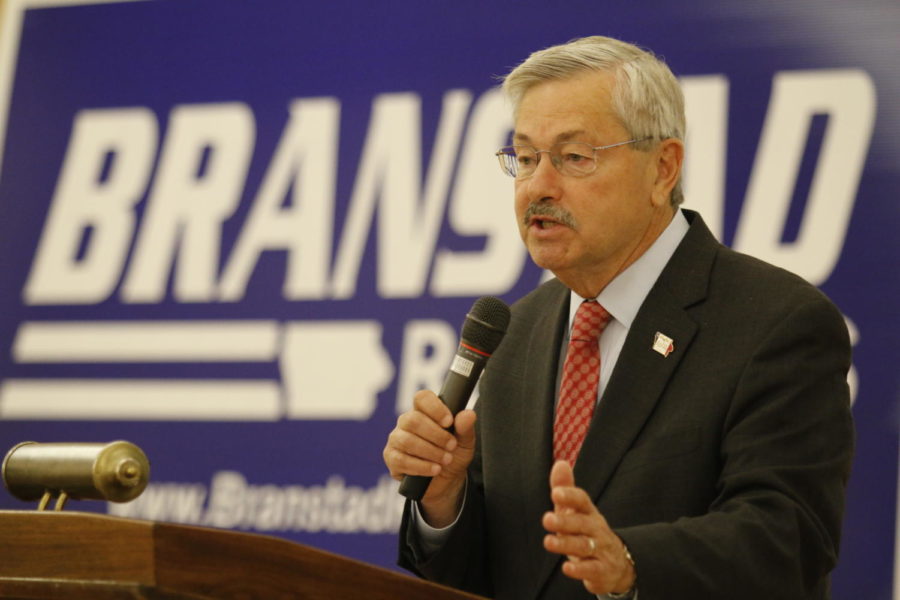5 takeaways from Branstad’s Condition of the State address
Iowa Gov. Terry Branstad during an event Sept. 9, 2014 in the Gallery Room of the Memorial Union at Iowa State University.
January 12, 2016
Iowa Gov. Terry Branstad delivered his annual Condition of the State address Tuesday. Here are five takeaways from his address:
1. Low budget projections concerns both parties
Members of both parties have said due to things like the avian influenza outbreak and low commodity prices, the state revenue projections would be lower than expected. Branstad echoed that concern Tuesday in his address.
“While we still see some growth, it is not as robust as we had hoped and expected,” Branstad said.
His budget does balance, the governor’s office says. The two highest spending areas are education and Medicaid. Read the full budget here.
2. Criminal justice reform is a priority
Branstad said after meeting with NAACP leaders in Iowa, he has decided to make criminal justice reform a priority in the state.
He called on the legislature to pass legislation protecting children and family members from human trafficking; to combat domestic violence; to examine the funding model for Drug and Mental Health Court; and to address the confidentiality of juvenile delinquency records.
“Ensuring the fundamental fairness of our system is a worthy goal,” Branstad said. “But a fairer and more equitable criminal justice system also aligns with the long-term interests of taxpayers who fund our criminal justice system.”
3. Increase in K-12 education, but silent on college
Even with low budget projections, Branstad said he is ready to increase K-12 funding the state by over $145 million, bringing the total cost statewide to over $3.2 billion this year.
“To make this level of funding possible, we have made tough decisions in other budget areas,” Branstad said. “It is my sincere hope the General Assembly will move quickly to approve supplemental state aid early this session.”
Besides mentioning he wants to see an increase in job training programs that will eliminate the skills gap between some students, he was silent on higher education funding.
Board of Regents President President Bruce Rastetter said in a statement that he appreciates the governor’s commitment to higher education and looks forward to working with the legislature.
“We will continue to be good stewards with the money that is appropriated to us. We will also continue to strive to find ways to be more efficient and effective with our funds,” Rastetter said.
4. Still moving forward with Medicaid privatization
One of Branstad’s first points was that he will continue the push to “modernize” Iowa’s Medicaid system by transitioning it to managed care by private companies.
“In order to improve patient health and increase the coordination of services–as well as control Medicaid costs–the state of Iowa is implementing a modern approach toward Medicaid through managed care, as most other states have already done” Branstad said. “If the state fails to implement managed care, the growth of Medicaid spending will consume virtually all of our revenue growth.”
5. Democratic response
Senate Majority Leader Mike Gronstal, D-Council Bluffs, told Iowa Public Television after the event that while he did not want to talk about it much, he was surprised Branstad would take credit to the wind energy program, which Gronstal said was only possible because of legislative action.
Gronstal also said he was disappointed that the governor did not talk about higher education funding more in his speech, saying Democrats are focused on growing the middle class, which includes controlling the cost of tuition.
House Minority Leader Mark Smith, D-Marshalltown, said in a statement that he agrees with the push for closing the “skills gap” with job training programs, he expressed concern about Branstad’s continued push to privative Medicare.
“I’m troubled that the Governor still isn’t listening to Iowans about the Medicaid mess he created last year,” Smith said. “There are real lives at stake and 560,000 Iowans are being forced in to a new private system without many answers. The Governor didn’t address any of their concerns today.”
















